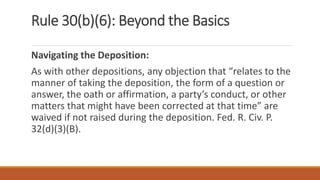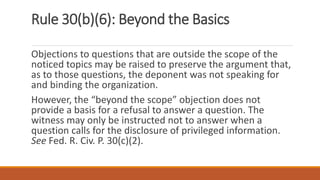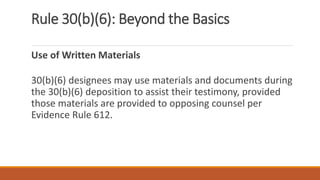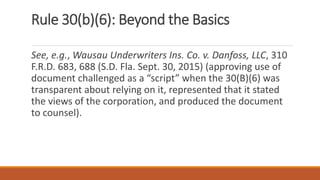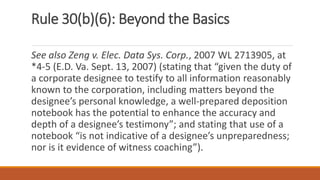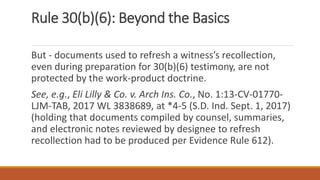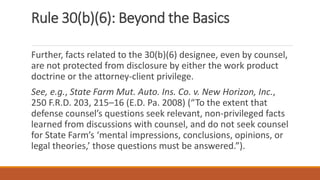The document outlines the fundamentals of Rule 30(b)(6) depositions, which allows a party to designate an organization as a deponent and require it to select representatives who will testify on its behalf regarding specific topics. Introduced in 1970 to streamline the discovery process, the rule seeks to minimize the 'bandying' of knowledge among corporate representatives by ensuring the organization prepares its designated deponents adequately. Failure to comply with the requirements of this rule can result in sanctions and binds the organization to the testimony given by its representatives.
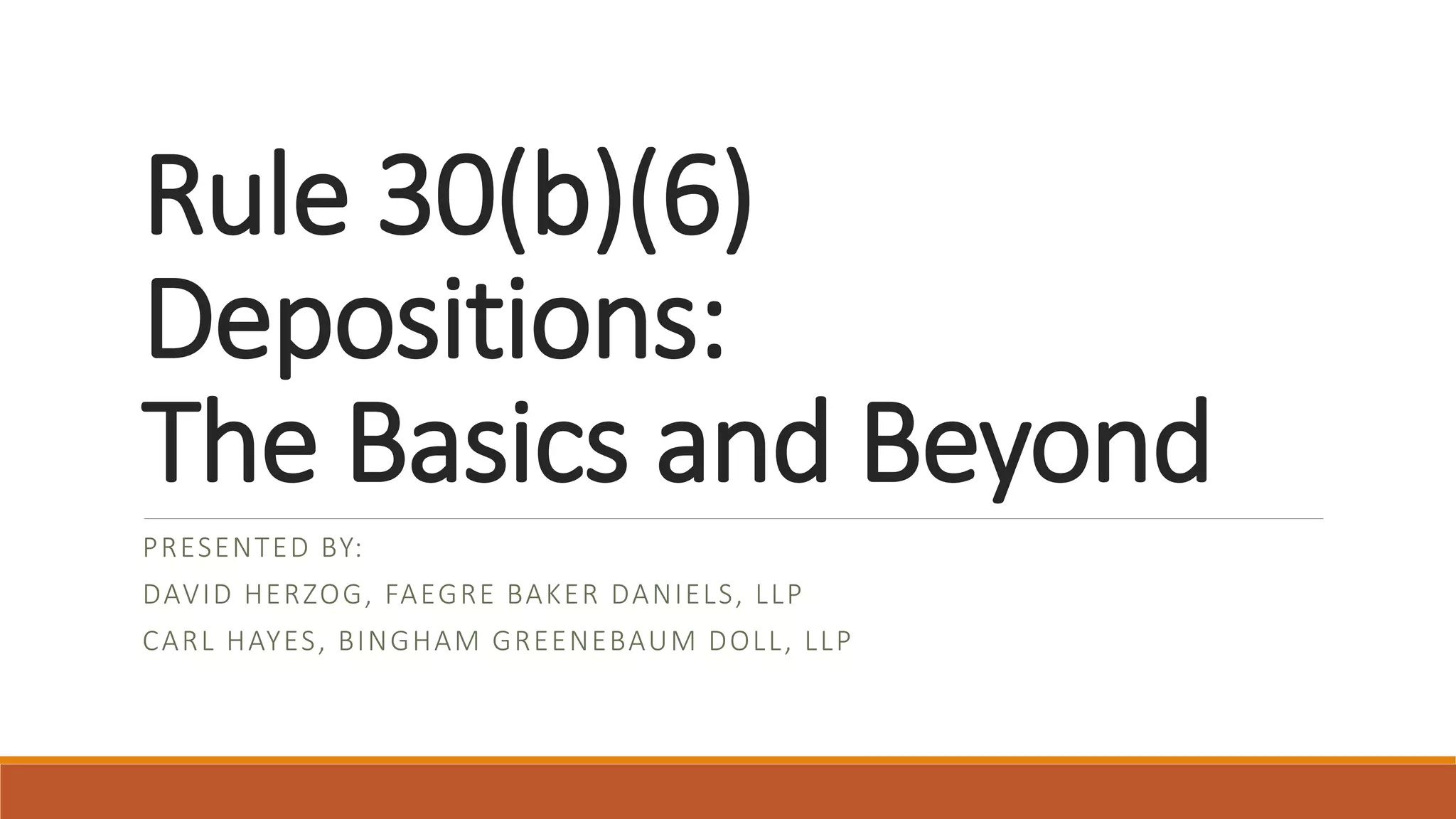
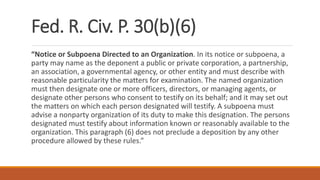
![Why Rule 30(b)(6)? – History and Purpose
Added to Federal Rules of Civil Procedure in 1970
“[O]perates as a vehicle for streamlining the
discovery process.” Hooker v. Norfolk S. Ry. Co.,
204 F.R.D. 124, 126 (S.D. Ind. 2001).](https://image.slidesharecdn.com/rule30b6depositions-180125185215/85/Rule-30-b-6-Depositions-The-Basics-and-Beyond-3-320.jpg)
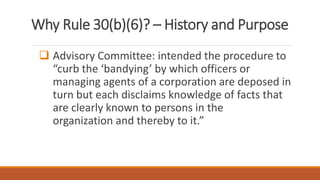
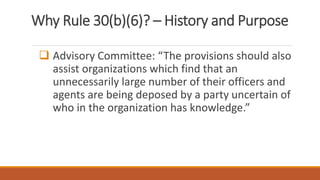
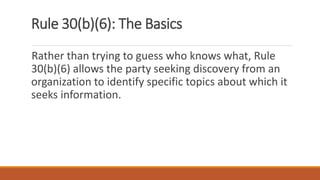
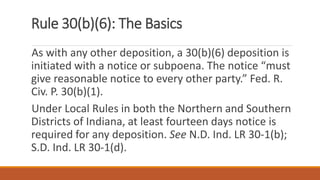
![Rule 30(b)(6): The Basics
As with any other deposition, the notice “must state
the time and place of the deposition[.]” Fed. R. Civ. P.
30(b)(1).
For a party deposition, the noticing party may
choose the location. If a responding party doesn’t like
the location, it may petition the court for a protective
order to pick a different place.](https://image.slidesharecdn.com/rule30b6depositions-180125185215/85/Rule-30-b-6-Depositions-The-Basics-and-Beyond-8-320.jpg)
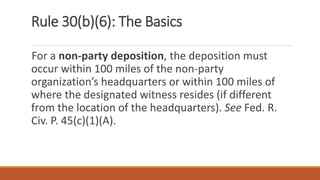
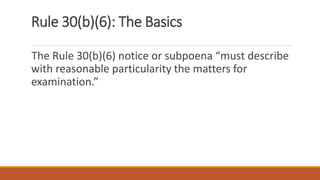
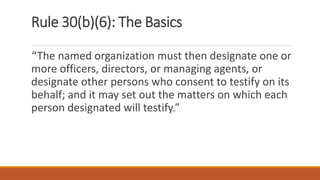
![Rule 30(b)(6): The Basics
In general, “[u]nless otherwise stipulated or ordered
by the court, a deposition is limited to one day of 7
hours.” Fed. R. Civ. P. 30(d)(1).
If the organization designates more than one person
to testify regarding 30(b)(6) topics, each designee is
considered a separate deposition for purposes of that
durational limit. See Advisory Committee notes to
2000 Amendments.](https://image.slidesharecdn.com/rule30b6depositions-180125185215/85/Rule-30-b-6-Depositions-The-Basics-and-Beyond-12-320.jpg)
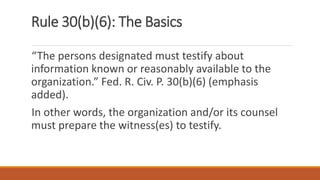
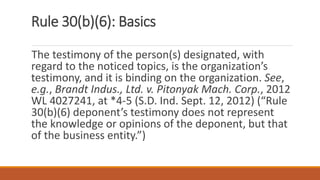
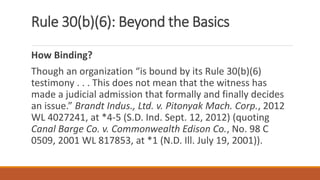
![Rule 30(b)(6): Beyond the Basics
See also A & E Products Group, L.P. v. Mainettie USA
Inc., No. 01 Civ. 10890, 2004 WL 345841, at *7 (S.D.N.Y. Feb.
25, 2004) (“[A] corporation is ‘bound’ by its Rule 30(b)(6)
testimony, in the same sense that any individual deposed
under Rule 30(b)(1) would be ‘bound’ by his or her
testimony. All this means is that the witness has committed
to a position at a particular point in time. It does not mean
that the witness has made a judicial admission that formally
and finally decides an issue.”).](https://image.slidesharecdn.com/rule30b6depositions-180125185215/85/Rule-30-b-6-Depositions-The-Basics-and-Beyond-16-320.jpg)
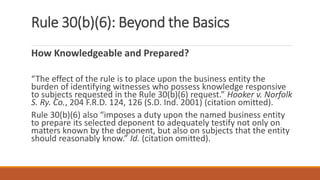
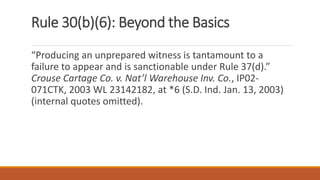
![Rule 30(b)(6): Beyond the Basics
See also QBE Ins. Corp. v. Jorda Enterprises, Inc., 277 F.R.D.
676, 696, 697–98 (S.D. Fla. 2012) (holding that corporation
“will not be able to take a position at trial on those issues
for which [the corporate representative] did not provide
testimony”).](https://image.slidesharecdn.com/rule30b6depositions-180125185215/85/Rule-30-b-6-Depositions-The-Basics-and-Beyond-19-320.jpg)
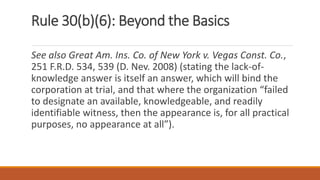
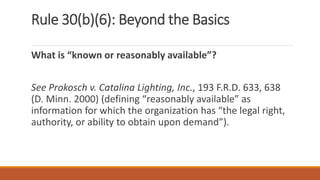
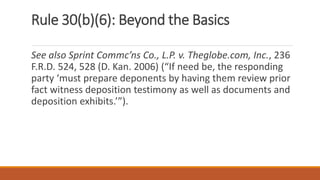
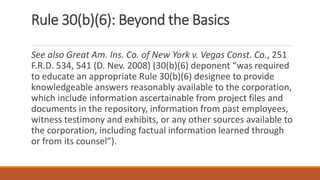
![Rule 30(b)(6): Beyond the Basics
But see Crouse Cartage Co. v. Nat’l Warehouse Inv. Co., IP02-
071CTK, 2003 WL 23142182, at *5-6 (S.D. Ind. Jan. 13, 2003)
(finding that organization complied with Rule 30(b)(6) where its
counsel forwarded the notice to high level employee and
“requested that he designate employees who may be
competent to testify on behalf of the corporation[,]” and
“witnesses testified they had not seen the notice of deposition
until the morning of their deposition, and that their knowledge
of the topics listed therein was limited.”](https://image.slidesharecdn.com/rule30b6depositions-180125185215/85/Rule-30-b-6-Depositions-The-Basics-and-Beyond-24-320.jpg)
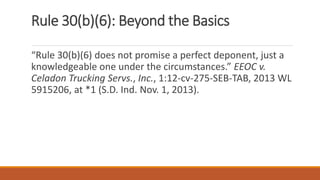
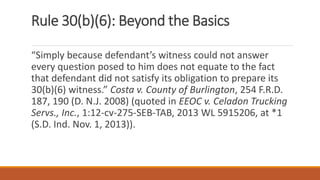
![Rule 30(b)(6): Beyond the Basics
How to Respond to Overreaching 30(b)(6) Notice?
“’[U]nless the party failing to act has a pending motion for
protective order,’” the party’s failure to appear at a
properly noticed deposition ‘is not excused.’” Slabaugh v.
LG Elecs. USA, Inc., 1:12-cv-01020-RLY-MJD, 2015 WL
500849, at *4 (S.D. Ind. Feb. 3, 2015) (quoting Fed. R. Civ. P.
37(d)(2)) (emphasis in original).](https://image.slidesharecdn.com/rule30b6depositions-180125185215/85/Rule-30-b-6-Depositions-The-Basics-and-Beyond-27-320.jpg)
![Rule 30(b)(6): Beyond the Basics
See also Pain Center of S.E. Ind., LLC v. Origin Healthcare
Solutions, LLC, 1:13-cv-00133-RLY-DKL, 2015 WL 5552646, at
*2 (S.D. Ind. Sep. 17, 2015) (awarding sanction of fees and
expenses and noting that, “[w]hen a party receives proper
notice of its deposition, only a pending motion for a
protective order will excuse it from appearing pursuant to
the notice.”) (citation omitted).](https://image.slidesharecdn.com/rule30b6depositions-180125185215/85/Rule-30-b-6-Depositions-The-Basics-and-Beyond-28-320.jpg)
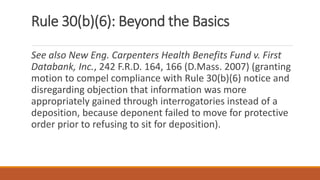
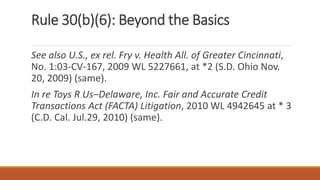
![Rule 30(b)(6): Beyond the Basics
What Do You Argue in Your Motion for Protective Order?
“Rule 30(b)(6) does not set its own discovery standard. . . .
[Rule] 26(b)(1) is the proper standard to resolve [a]
dispute.” Hooker v. Norfolk S. Ry. Co., 204 F.R.D. 124, 126
(S.D. Ind. 2001).](https://image.slidesharecdn.com/rule30b6depositions-180125185215/85/Rule-30-b-6-Depositions-The-Basics-and-Beyond-31-320.jpg)
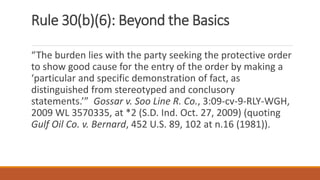
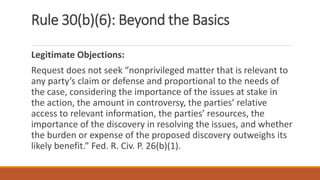
![Rule 30(b)(6): Beyond the Basics
Legitimate Objections:
“[T]he discovery sought is unreasonably cumulative or
duplicative, or can be obtained from some other source that
is more convenient, less burdensome, or less expensive[.]”
Fed. R. Civ. P. 26(b)(2)(i).
The identified topics fail to “describe with reasonable
particularity the matters for examination.” Fed. R. Civ. P.
30(b)(6).](https://image.slidesharecdn.com/rule30b6depositions-180125185215/85/Rule-30-b-6-Depositions-The-Basics-and-Beyond-34-320.jpg)
![Rule 30(b)(6): Beyond the Basics
What Types of Requests Do Not Pass Muster?
See, e.g., Gossar v. Soo Line R. Co., 3:09-cv-9-RLY-WGH, 2009 WL
3570335, at *2 (S.D. Ind. Oct. 27, 2009) (granting protective
order as to topic of “[a]ll facts alleged by Defendant in its
Answer and Affirmative Defenses” and noting that “a party may
not serve a Rule 30(b)(6) notice for the purpose of requiring the
opposing party to marshal all of its factual proof and prepare a
witness to be able to testify on a particular defense.”) (internal
quotes and citation omitted).](https://image.slidesharecdn.com/rule30b6depositions-180125185215/85/Rule-30-b-6-Depositions-The-Basics-and-Beyond-35-320.jpg)
![Rule 30(b)(6): Beyond the Basics
See also Catt v. Affirmative Ins. Co., 2:08-CV-243-JVB-PRC, 2009
WL 1228605, at *6-7 (N.D. Ind. Apr. 30, 2009) (noting that “[t]he
purpose of the reasonable particularity requirement is to allow
the business to identify a witness . . . who possesses knowledge
responsive to the subjects identified” and granting protective
order as to topics such as “facts contained in the documents to
be produced,” the “allegations of the Plaintiff’s complaint,” and
the “allegations and answers of the defendant’s answer and
affirmative defenses”).](https://image.slidesharecdn.com/rule30b6depositions-180125185215/85/Rule-30-b-6-Depositions-The-Basics-and-Beyond-36-320.jpg)
